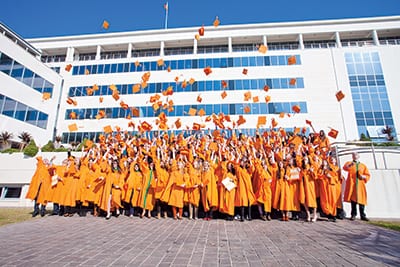Montenegro’s University of Donja Gorica (UDG) has around 3,000 students and 350 professors and teaching assistants from all continents, a modern-designed building with facilities for all-day use, consisting of five amphitheatre lecture halls, a library, 800 computers, a creative centre, gallery, gym etc
The University of Donja Gorica (UDG) develops innovative study model that represents an original idea of this university, inspired by American principles. The university is orientated towards the student and their capabilities, aimed at developing students into responsible global citizens says for CorD Dr Veselin Vukotić PhD, Rector of Donja Gorica University.
The UDG mission is to create study conditions that adhere to the highest European principles. What does that mean?
 – The UDG mission is reflected in the motto “The history of the future”, meaning that we are producing the seeds of the future as the strictest professor students will ever face is their Life. So, we don’t teach about life (facts), but rather we make students learn from life.
– The UDG mission is reflected in the motto “The history of the future”, meaning that we are producing the seeds of the future as the strictest professor students will ever face is their Life. So, we don’t teach about life (facts), but rather we make students learn from life.
The classical university model is capabilities = knowledge. However, according to our model S=Z•i², in which “i” stands for the intensity of the life (experiences) of students during their studies… One only knows things that have been experienced and sensed… So, our students are prepared to react to the fast changes and uncertainty that are being brought by high technology and this almost spiritless world… In order for them to be ready for whatever comes! (Njegoš) We invest a lot in promoting students’ self-confidence and their passion for studying. All principles are presented in the UDG Almanac of studies.
What about conditions and support for the environment?
– We improve conditions for development continuously, having started from an empty field. Our campus is today dominated by the modern designed UDG building (covering a surface area of 17,000m²) with facilities for all-day use, consisting of five amphitheatre lecture halls (each with a capacity of 300 places), a library (c.350 places), around 800 computers used every day for teaching purposes, 3D printers and laboratories for food safety, a creative centre, gallery, gym and much more…
UDG studies start every year on 4th July with the Lovćen Marathon and my lecture at top of this Mountain, in front of Njegoš… Students must become accustomed to thinking that it is not easy to reach the top
UDG has around 3,000 students and 350 professors and teaching assistants from all continents. Our platform is one of openness and cooperation with the local and global environments. We have rich international cooperation and the majority of UDG students are given an opportunity to work and study abroad, through exchanges, internship programmes, or for seasonal work.
Our current focus is on cooperation with China and we will soon introduce Chinese studies…
You are known for multidisciplinary studies. How important are they for students?
– The era of deeper specialisation developed a need for interdisciplinary knowledge. This approach will enable students to transfer from one occupation to another, as they are expected in today’s world to change occupations five to six times during their careers. Our vision is to develop a model within which first two years of the study programme will be the same, after which students will make their “study choice”, metaphorically, like exiting a roundabout in a vehicle. We have lots of joint courses and projects at the university level, involving all students. The greatest advantage to that is the fact that all UDG faculties operate within a single building.
UDG studies are not “mass studies”. What are the advantages of this approach?
– We develop an individual dedication to students within the scope of mentor work in small groups.
 This kind of approach can encourage students to find their natural hidden talents, which is not the case with mass studies. The task of professors should be to “awaken students’ passion for studies”. Today’s young generations develop in a world of big data & modern technologies, which impacts on the structure of their brains. Study programmes must be based on their openness. UDG charges tuition fees, which is not the case with the state university, where studies are free.
This kind of approach can encourage students to find their natural hidden talents, which is not the case with mass studies. The task of professors should be to “awaken students’ passion for studies”. Today’s young generations develop in a world of big data & modern technologies, which impacts on the structure of their brains. Study programmes must be based on their openness. UDG charges tuition fees, which is not the case with the state university, where studies are free.
Still, the best youngsters choose to come to study at UDG, which ensures our responsibility is even greater…
You have 17 undergraduate study programmes, more than 20 postgraduate options and three PhD programmes. Which are the most popular?
– UDG has a large number of study programmes that suit or will suit, the needs of the market. UDG faculties are separate entities, though we are still developing the UDG brand and working on an integrated university platform.
Around 50 UDG students have had internships at Chinese companies, while around the same number of Chinese students have spent time studying at the UDG
Students primarily decide to enrol in UDG, only then choosing the specific faculty. We are a rare private university in that we offer study programmes for technical sciences (polytechnics, electro, geodetics) and programmes in maths, food safety and graphic design, international French franchise Vatel (double-degree in tourism), aside from classical social and humanities studies. We also invest a lot in IT studies. The UDG psychology studies programme is among the best in the region, as is its art studies programme. We will soon gain accreditation for two more programmes: Virtual communications and Virtual engineering. The official language of the UDG is English, while students are obliged to have knowledge of two foreign languages in order to gain a degree.
Your university is among the few that are investing in the broader education and cultural development of students, with fun, sport, art and travel. Does that increase the quality of a UDG degree?
– All of that is part of the “i” in the model S=Z•i². The habit of reading books has been lost. Now people read and write short messages instead. The quality of studies should be defined more by a student’s system of values, character, and humanity; his “being” rather than his “knowing”. Art, poetry and literature are fundamental for developing an understanding of the world which we live in. We try to fix the failures of earlier phases of education in different ways. I am running a course in which I tasked students with writing an essay on the topic “Macroeconomics in Ivo Andrić’s books”. If you recognise the origins of the facts that you know in real life, you can say that you understand them. To know and to understand are not one and the same.
What is the level of employability of your students, both at home and abroad?
– We aim to ensure that UDG students don’t need to look for a job after graduation, by improving conditions for them to “find” work earlier, through employment in foreign or local companies who seek out our students, or by encouraging them to open and run their own firms or family businesses. Demand for UDG students is on the rise. The entrepreneurial spirit is developed within the course Entrepreneurship and innovation, which is part of every UDG faculty’s curriculum, but also through the international IDEALAND competition, which has been organised for a decade at the UDG, along with the School of Entrepreneurship and Talent Camp, intended for primary and secondary school pupils.
Universities should create the market! As such, we’ve built “Entrepreneurial nest” for the development of start-ups, and cooperation with Tel Aviv University and the “Israeli desert” tech-kibbutz. We are focused on strengthening cooperation with Chinese companies and will soon do the same with institutions from Thailand and Singapore. The UDG has numerous national and European projects; we are part of several Horizon 2020 consortia, with research results presented to students and employees on the annual Day of Research, held every 4th April. Let me point out the symbolic meaning of the Day of the UDG, which is commemorated each year on 11.11. at 11 am, to reflect our mantra that it is most important to be the first, and then the best.